|
|
|
Sort Order |
|
|
|
Items / Page
|
|
|
|
|
|
|
| Srl | Item |
| 1 |
ID:
135102


|
|
|
|
|
| Summary/Abstract |
The article documents the evolution of the structural dimension in South Korean foreign policy through a study of middle-power diplomacy in the post-2008 financial crisis period. This article argues that middle-power diplomacy, which propounds a global role for South Korea assuming leadership and substantially increasing international contribution is a paradigm shift in South Korean foreign policy posture, which until recently was limited to issues of the Korean peninsula. Through the middle power discourse South Korea projects its role in international affairs as a facilitator, interlocutor and norm entrepreneur focusing on international security, development and environment and is aims to create a space for Korean diplomatic entrepreneurism in the emerging international order.
|
|
|
|
|
|
|
|
|
|
|
|
|
|
|
|
| 2 |
ID:
136114


|
|
|
|
|
| Summary/Abstract |
In August 2012, Armed Forces & Society published an article by Insoo Kim, “Intra-military Divisions and Democratization in South Korea.” Uk Heo and Seongyi Yun refuted Kim's argument in their Disputatio Sine Fine response, “Another View on the Relationship between Democratization and Intra-Military Division in South Korea,“ published in April 2013. In the article, Heo and Yun argued that there was no clear sign of schism in the South Korea military and economic development substantially produced favorable condition for democratization in South Korea. Kim, by contrast, maintains that that the effect of intra-military division on political transition should be incorporated into the explanation of democratization in South Korea because Heo and Yun do not justify their claim that there was no clear evidence of schism in the South Korean military.
|
|
|
|
|
|
|
|
|
|
|
|
|
|
|
|
| 3 |
ID:
136584


|
|
|
|
|
| Summary/Abstract |
The Korean government is emphasizing the role of the defense industry in a bid to connect it more firmly with the country’s economy as a whole. Following the previous government’s policy of developing the defense industry into a new economic
growth engine, the current government is seeking to create innovative defense R&D basis and boost new business in the defense industry as one of the key agendas in the defense acquisition program administration. The key of this policy is how to improve the defense R&D system and industrial base through “Openness and Competition,” which is contrasted to the past policy strongly based on protectionism. In order to realize this, the Korean government is endeavoring to move toward leading future development. This change of focus will require a comprehensive understanding on business environment and performance of the defense industry. The reality faced by defense companies should also be considered from a more objective perspective. In this context, this paper examines the overall management of Korean defense companies and evaluates the policy implications that can be identified in this regard. The main contents of this paper include an overview of supply base of the defense industry, an outline of the trends and structural characteristics of defense revenues, and analyses of overall management status associated with financial matters; number of workers employed; amount of investments; domestic supply of defense items production; and defense exports. Furthermore, by comparing the changing trends of business indicators, points worth considering in the establishment of the future direction of defense policy have been put forward.
|
|
|
|
|
|
|
|
|
|
|
|
|
|
|
|
| 4 |
ID:
135932
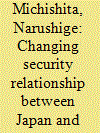

|
|
|
|
|
| Summary/Abstract |
Japan has long played the role as the main operating base for Korean contingencies. It has also provided rear-area logistic support to the US forces fighting in Korea and helped South Korea build up its defense industrial base. However, the Japan-South Korea relationship has deteriorated in recent years due to short-term political and long-term economic and strategic reasons. At this point, South Korea is bandwagoning with China and deemphasizing its relationship with Japan. China-South Korea relations are not without problems, however, and Japan regards South Korea as one of the most important potential strategic partners in maintaining stability in Asia. In the future, the most decisive factor in determining the direction of the security relationship between Japan and South Korea will be China.
|
|
|
|
|
|
|
|
|
|
|
|
|
|
|
|
| 5 |
ID:
135070


|
|
|
|
|
| Summary/Abstract |
Purpose—Despite the tension between North Korea and South Korea, tourists from China and other countries are visiting North Korea at an increasing rate. This article aims to examine the background, development trends and other factors affecting this phenomenon.
Design/Methodology/Approach—Using tourism data from the China National Tourism Administration, local reports and the news, this study attempts to analyze the growing trend of Chinese tourists to North Korea.
Finding —The results provide substantial support for the authors’ conclusion that it is possible Chinese tourists to North Korea will continue at increasingly higher rates in the coming years. Non—Chinese tourists to North Korea are also increasing. Practical 1mplications—This study provides evidence that North Korea is becoming more open and active in the tourism business, a sign that North Korea is changing its economic policy.
|
|
|
|
|
|
|
|
|
|
|
|
|
|
|
|
| 6 |
ID:
135294
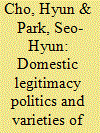

|
|
|
|
|
| Summary/Abstract |
What drives East Asian regionalism? The rise of China and the perceived decline in the influence of the United States have sparked debates about the future of the regional order, including the yet-unresolved question of whose leadership is likely to be more stable and accepted as legitimate by other regional actors. What is puzzling, however, is that persistent demands for the formation of a coherent and uniquely East Asian regional institution have come not from China or the US, as is the focus of existing studies, but rather Japan and South Korea. In this article, we propose an alternative framework that conceptualises the varieties of East Asian regionalism, emphasising the multiple pivots and variegated levels of politics involved in efforts toward regional cooperation. We find that competing proposals for East Asian regionalism since the 1990s are not determined by structural pressures or the convergence of interests but rather result from domestic legitimacy politics. Japanese and Korean leaders have, at different time periods, proposed their own alternative region-making initiatives appealing to domestically contested views on how best to seek autonomy from the region's Great Powers as a way to enhance their political standing domestically and regionally.
|
|
|
|
|
|
|
|
|
|
|
|
|
|
|
|
| 7 |
ID:
134246
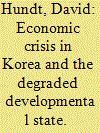

|
|
|
|
|
| Summary/Abstract |
This article analyses the Korean developmental state since the late 1990s, and argues that the state has continued to play a weighty role in the economy. The state guided industrial and financial restructuring after the Asian economic crisis, and intervened to stimulate the economy during the 2008 global financial crisis. In doing so, state elites have displayed a distinctive form of economic leadership that is largely consistent with the developmental state. Rather than focusing predominantly on performance-related indicators of state strength such as growth rates, this article analyses the deeper aspects of the developmental state, specifically its internal functions and its collaboration with business. The article brings politics back into analysis of the developmental state by questioning the assumption that strong economic performance is necessary for the maintenance of close ties between the state and chaebol. Instead, economic performance is better understood as a predictor of patterns of conflict and cooperation. Long-standing ties between the state and big business have endured two significant economic crises, even if the performance of the developmental state has been degraded compared to earlier decades.
|
|
|
|
|
|
|
|
|
|
|
|
|
|
|
|
| 8 |
ID:
135059
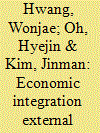

|
|
|
|
|
| Summary/Abstract |
Purpose—This study examines whether economic integration between South and North Korea has promoted political cooperation and whether external forces are still a dominant factor in explaining their behavior. Design/methodology/approach—This study is based on a quantitative analysis of roll call data in the United Nations General Assembly (UNGA) between 1991 and 2011. Vote coincidence between South and North Korea is examined. Findings—Empirical results show that economic integration does not generate significant effects on cooperation between the two Koreas, while their vote coincidence is strongly influenced by the political positions of the U.S. and China. Meanwhile, the two Korea’s tend to agree on economic issues but show dissimilar voting patterns over nuclear, security, and human rights issues.
Practical implication’s—The findings imply that economic and humanitarian cooperation between South and North Korea cannot be easily transferred to political cooperation in other areas without drawing support from powers such as the U.S. of economic integration on cooperation, efforts to reduce the North’s security concerns resulting from asymmetric dependence need to be followed.
|
|
|
|
|
|
|
|
|
|
|
|
|
|
|
|
| 9 |
ID:
136583


|
|
|
|
|
| Summary/Abstract |
The goal of this study is to examine the effects of the joint education program that was newly constituted by the South Korean Army, Navy, and Air Force Academy in 2012 to improve the South Korean military’s joint operational capability. This paper investigates whether the joint education program bridged the cultural gaps that had existed historically among the armed services, resulting in a greater exchange of camaraderie and information. The findings demonstrate the positive impact of a joint education program on the exchange of camaraderie. In the later stage of joint education, military cadets are less likely to exchange camaraderie with those who came from the same military academy; but they are more likely to exchange camaraderie with those who share the same room in the military barracks, and with those who participate in formal training in the same classroom. In comparison to the exchange of camaraderie, however, the joint education program failed to produce a collaborative atmosphere in which three random service academy cadets actively exchanged information with one another. The South Korean case provides a model for building cohesion across different service members by using education, while also demonstrating its limitations.
|
|
|
|
|
|
|
|
|
|
|
|
|
|
|
|
| 10 |
ID:
137137


|
|
|
|
|
| Summary/Abstract |
In this study, the motivation behind South Korea's active participation in UN peacekeeping operations is examined. Specifically, whether its participation is driven by economic, political or normative considerations is explored. The argument made here is that a normative consideration is the main factor behind Korea's participation in UN peacekeeping operations. The example of Korea illustrates that not only economic and political considerations but also normative concerns are among the national interests that drive countries to engage in issues of human rights violations in the international community.
|
|
|
|
|
|
|
|
|
|
|
|
|
|
|
|
| 11 |
ID:
135046


|
|
|
|
|
| Summary/Abstract |
South Korea is not a traditional Arctic state, but it has several key interests in the region. This article explores the sources of those interests and the country’s commercial activities in the Arctic in the areas of shipping, shipbuilding and hydrocarbons. Since the country’s polar interests transcend commerce, however, attention is also paid to the importance of science and research and development in Korean culture. The article examines South Korea’s regional role in the Arctic, arguing that the country fits into an expanded area of Arctic destinational shipping centred on the Northern Sea Route. Arctic states have generally welcomed the country as a partner in the region, and South Korea’s rise in the north appears likely to continue as part of its broader effort to transform into a globally important political and economic actor.
|
|
|
|
|
|
|
|
|
|
|
|
|
|
|
|
| 12 |
ID:
136580


|
|
|
|
|
| Summary/Abstract |
The purpose of this study is to examine the antecedents of social adaptation among North Korean refugees in South Korea. The paper hypothesizes that the relationship between perceived discrimination and social adaptation in South Korea will be mediated by national identity. To test this, a survey was conducted of 405 North Korean refugees in Seoul and Gyeonggi Province in South Korea. Social adaptation among North Korean refugees was associated with perceived discrimination in South Korea. That relationship was mediated by their national identity. In this study, national identity was a partial rather than a full mediator of the relationship between perceived discrimination and social adaptation. This is consistent with the hypothesis that perceived discrimination has not only direct effects on social adaptation, but also has indirect effects on social adaptation through national identity as a mediator. Based on the findings, this study presents practical suggestions for intervention for reducing their discrimination experience and promoting social adaptation and national identity among North Korean refugees in South Korea.
|
|
|
|
|
|
|
|
|
|
|
|
|
|
|
|
| 13 |
ID:
134910


|
|
|
|
|
| Summary/Abstract |
American journalists radically changed the tenor of the media coverage about South Korea during the seventies. By reporting instances of human rights abuses perpetrated by South Korea’s Park Chung-hee government, they brought into question the longstanding U.S. support of the Park government. Their reporting played a central role in the 1976 congressional probe of the Korean Central Intelligence Agency (KCIA). The controversy that emerged from the investigation helped generate public skepticism for the Park government and create public support for the confrontational policies toward South Korea adopted by the Carter administration. Their role in the KCIA investigation suggests journalists were important actors in the emergence of human rights diplomacy during the seventies. Through their documentation of human rights abuses in places like South Korea, they contributed to wider efforts to halt U.S. support for authoritarian regimes and make human rights a factor in U.S. foreign policy.
|
|
|
|
|
|
|
|
|
|
|
|
|
|
|
|
| 14 |
ID:
134701
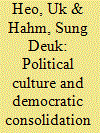

|
|
|
|
|
| Summary/Abstract |
South Korea experienced democratization in 1987, yet violations of the democratic rule of law are rather common; such actions are far from routine practices of democratic institutions. We argue that South Korea’s political culture is the reason for the tardy maturing of democratic institutions.
|
|
|
|
|
|
|
|
|
|
|
|
|
|
|
|
| 15 |
ID:
135791


|
|
|
|
|
| Summary/Abstract |
This study examines the reform trajectory of financial supervision in South Korea after the 1980s, focusing on external and internal political–economic factors. Research results indicate that the changed economic landscape led the government, which once utilized financial supervision as a tool to support industrial policy, to alter its aims and pursue the development of the financial market itself. During this transformational process, the 1997 Asian financial crisis functioned as a powerful stimulus for the reform of the previous supervisory system. The process was also marked by social actors’ efforts to affect related policies and the government’s efforts to control the reform process, as well as confrontations between organizations that supported contradictory reform plans. A multi-strategy approach including in-depth interviews with a senior staff member from a government financial regulatory agency, literature reviews, and secondary data collection, was adopted in order to enhance the validity and reliability of this paper.
|
|
|
|
|
|
|
|
|
|
|
|
|
|
|
|
| 16 |
ID:
135270


|
|
|
|
|
| Summary/Abstract |
The economic, political, and social situation in post-2014 Afghanistan remains uncertain, particularly because the effects of the US drawback from Afghanistan on national and regional stability are rather difficult to foresee. In this article, we explore how the debates about post-2014 Afghanistan impact others' thinking. Afghanistan forces national governments and political leaders to reflect deeply on their policies toward Afghanistan and the wider region. Hence, the “Afghanistan problem” becomes a geopolitical imagery within other countries' discourse. Here we scrutinize the impact of post-2014 Afghanistan on South Korean and Chinese foreign policy practices, enabling us also to become familiar with Chinese and South Korean understanding of their political position in Asia.
|
|
|
|
|
|
|
|
|
|
|
|
|
|
|
|
| 17 |
ID:
134758


|
|
|
|
|
| Summary/Abstract |
China has a complex relationship with its neighbours. With its increasing power, past problems have resurfaced, which will strain relationships between China and its neighbours. As its rise disturbs the balance of power within the region, Japan, South Korea and other regional powers will bear mixed feelings towards its growing regional influence. Despite China’s emphasis on a “peaceful rise”, the international system is always interpreted as a zero-sum game. From this perspective, China’s increasing influence in East Asia comes at the expense of other powers, as this article explains. By exploring both old and new problems between China and its East Asian neighbours, this article analyses the difficulties that China’s rise and other controversial issues in the region present.
|
|
|
|
|
|
|
|
|
|
|
|
|
|
|
|
| 18 |
ID:
134981


|
|
|
|
|
| Summary/Abstract |
Building on the rationalist literature on sanctions, this article argues that economic and political sanctions are a successful tool of nonproliferation policy, but that selection effects have rendered this success largely hidden. Since the late 1970s—when the United States made the threat of sanctions credible through congressional legislation and began regularly employing sanctions against proliferating states—sanctions have been ineffective in halting ongoing nuclear weapons programs, but they have succeeded in deterring states from starting nuclear weapons programs in the first place and have thus contributed to a decline in the rate of nuclear pursuit. The logic of the argument is simple: rational leaders assess the risk of sanctions before initiating a nuclear weapons program, which produces a selection effect whereby states highly vulnerable to sanctions are deterred from starting nuclear weapons programs in the first place, so long as the threat is credible. Vulnerability is a function of a state's level of economic and security dependence on the United States—states with greater dependence have more to lose from US sanctions and are more likely to be sensitive to US-sponsored norms. The end result of this selection effect is that since the late 1970s, only insulated, inward-looking regimes have pursued nuclear weapons and become the target of imposed sanctions, thus rendering the observed success rate of nonproliferation sanctions low. I find support for the argument based on statistical analysis of a global sample of countries from 1950 to 2000, an original data set of US nonproliferation sanctions episodes, and qualitative analysis of the South Korean and Taiwanese nuclear weapons programs.
|
|
|
|
|
|
|
|
|
|
|
|
|
|
|
|
| 19 |
ID:
134269


|
|
|
|
|
| Summary/Abstract |
Romania and South Korea were once among the top sending countries for adoptive American families. In recent years, though, both have adopted significant restrictions on intercountry adoption. What leads countries to introduce such severe restrictions? This article argues that shame plays a significant, yet underappreciated, motivating factor for leading governments to change their laws on intercountry adoption. Political leaders seize on nationalist rhetoric to argue that intercountry adoption is shameful. The article explores the interaction between intercountry adoption and shame through brief case studies on Romania and South Korea. Finally, it examines the role of the Hague Convention on Protection of Children and Cooperation in Respect of Intercountry Adoption (Hague Adoption Convention) in ameliorating these feelings.
|
|
|
|
|
|
|
|
|
|
|
|
|
|
|
|
| 20 |
ID:
134847
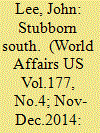

|
|
|
|
|
| Summary/Abstract |
While South Korean President Park Geun-hye has conferred with Chinese President Xi Jinping five times since 2013, most recently during a June 2014 summit in Beijing, she has refused several invitations to meet one-on-one with Japanese Prime Minister Shinzo Abe. Her excuse is that the Japanese leader and his country have not demonstrated sufficient and sincere remorse over Japanese actions during World War II and prior, such as the use of Koreans as “comfort women” for imperial Japanese soldiers. But the animosity is odd, in spite of this terrible past, since Japan and South Korea share a great power ally and protector in the United States and both are committed liberal democracies in a region where a nuclear-armed North Korea remains a major security threat. And the interests of both countries would be adversely affected if China changes the strategic and military balance in the region in a way that radically diminishes American power and influence.
|
|
|
|
|
|
|
|
|
|
|
|
|
|
|
|
|
|
|
|
|